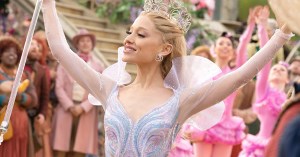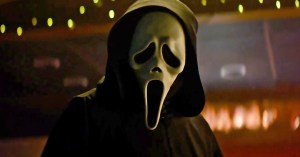Emily Watson’s 10 Best Movies
We look at the ten best-reviewed films of the Little Boy star.
Starting with her breakout performance in 1996’s Breaking the Waves, Emily Watson has assembled a truly impressive filmography over the years — and with her latest effort, Little Boy, arriving in theaters this weekend, we decided there was no time like the present to take an appreciative look back at some of its brightest critical highlights. It’s time for Total Recall!
10. The Water Horse: Legend of the Deep (2007) 74%

Emily Watson has more than her share of harrowing dramas in her filmography, but with 2007’s The Water Horse: Legend of the Deep, she proved she also has a pretty good knack for picking a heartwarming family-friendly script. Adapted from Dick King-Smith’s children’s novel of the same name, Water Horse uses a modern-day conversation in a Scottish bar as the framing device for a gently mystical trip back in time to the ’40s, when a boy (Alex Etel) stumbles upon a mysterious egg on the shores of Loch Ness and… Well, you can probably see where this is heading, but director Jay Russell’s sensitive depiction of the book (from Robert Nelson Jacobs’ screenplay) and the work of a fine cast (including Watson as Etel’s mother) still add up to rousing, heartwarming fun for viewers of all ages. According to Colin Covert of the Minneapolis Star Tribune, “The film is what family entertainment ought to be, but so rarely is: a ripping good adventure, a parable about childhood and maturity, and a romp.”
9. War Horse (2011) 74%

Name a movie War Horse, and you’re essentially signifying that your entire human cast is playing second fiddle to its equine lead — but in Steven Spielberg’s 2011 adaptation of Michael Morpurgo’s 1982 children’s novel, those human stars are still pretty spectacular. Exactly the sort of beautifully filmed period drama you’d expect given its behind-the-scenes pedigree and Christmas Day release date, War Horse follows the astonishing WWI adventures of a Bay Thoroughbred named Joey, as well as the equally stirring tale of his young trainer (Jeremy Irvine) and his family (Watson and Peter Mullan). While some critics dismissed the results as glossy awards bait, it proved sufficiently moving for the majority; as Steven Rea wrote for the Philadelphia Inquirer, “War Horse is sugary, to be sure — but it is sugar cut with cannon fire and barbed wire and the horrors of war.”
8. Punch-Drunk Love (2002) 79%

Playing the yin to Adam Sandler’s yang can often be a rather thankless task, as has been ably demonstrated by a list of thespians that includes Salma Hayek, Marisa Tomei, and Jennifer Aniston, but in Paul Thomas Anderson’s Punch-Drunk Love, Watson brought the best out of him, anchoring Anderson’s warped, tender drama with a quiet soulfulness that underscored an arguably career-best performance from Sandler. As a pair of wounded hearts timidly connecting between halting overtures punctuated by bursts of Anderson-style chaos, the duo brought two of the writer-director’s most deeply relatable characters vividly to life. “It’s wacky. It’s unpredictable,” wrote Susan Stark for the Detroit News. “It’s sure to give pause to Sandler fans and, smaller in number but every bit as dedicated, to Watson admirers too.”
7. The Theory of Everything (2014) 81%

James Marsh’s biopic of renowned scientist Stephen Hawking earned mountains of acclaim, most of it for Eddie Redmayne’s Oscar-winning work in the starring role, but Redmayne had plenty of company in terms of outstanding acting talent, including Felicity Jones (also Oscar-nominated) as Hawking’s wife Jane, David Thewlis as one of Hawking’s professors, and Watson as Jane’s mother. The result was a production that matched its largely positive reviews with the kind of box office befitting a tastefully mounted tale of real-life courage in the face of enormous adversity; as Claudia Puig wrote for USA Today, “Marsh takes a complicated persona and reveals a range of dimensions. The result is an engaging biopic that is often quite moving.”
6. The Boxer (1997) 80%

Most boxing movies use the battle inside the ring as a sort of mirror or metaphor for conflicts the protagonists are forced to deal with during everyday life, and Jim Sheridan’s The Boxer is an example of this cinematic formula writ large: Danny Flynn (Daniel Day-Lewis) returns to his old neighborhood after serving a lengthy prison sentence for charges stemming from his IRA membership, only to find his old stomping grounds gutted by financial and emotional malaise. His efforts to find redemption by reopening the community gym — and his continual torch-carrying for a married ex-girlfriend (Watson) — are cause for hope even as they ratchet up the tension for a grueling final act. “Day-Lewis has the ability to make the will to nonviolence look positively volcanic,” wrote an admiring Carrie Rickey for the Philadelphia Inquirer, “and Watson, with her 200-watt incandescence, makes longing look radiant.”
5. Belle (2014) 84%

The remarkable real-life story behind a well-known 1779 painting inspired screenwriter Misan Sagay to pen the script for Belle, a handsomely mounted historical drama that ended up becoming one of the more widely acclaimed films of 2014 — and served as a coming-out party for its magnetic star, Gugu Mbatha-Raw. She plays the titular character, a woman born into slavery but raised as a British noblewoman, whose story plays out against the backdrop of a pivotal time for British law and societal mores, and while the movie definitively rests on Mbatha-Raw’s performance, she’s ably aided and abetted by a stellar supporting cast that included Watson, Tom Wilkinson, and Miranda Richardson. “It’s smartly acted, handsome, and well-crafted in a way that’ll make it irresistible to the Merchant-Ivory/Masterpiece Theater set,” wrote NPR’s Bob Mondello. “Think pride, with a whole lot of prejudice.”
4. Gosford Park (2001) 87%

Before we had Downton Abbey, director Robert Altman gave us Gosford Park — a period British mystery brought to life by a veritable who’s who of U.K. acting talent that included Watson (nominated for a Satellite Award for Best Actress) along with Maggie Smith, Michael Gambon, Kristin Scott Thomas, Helen Mirren, and Stephen Fry, among many others. While Altman’s foray into Agatha Christie territory may have caught some viewers off guard, few critics were complaining after the credits rolled; as Peter Rainer wrote for New York Magazine, “Altman is a supreme artist-joker, and the jest this time is that the most American of film directors has given us a finely wrought British whodunit with the emotional layering of a first-rate novel.”
3. Breaking the Waves (1996) 84%

Watson received her first Academy Award nomination for Breaking the Waves, which also happened to be her first film role — not a bad outcome for a part that would have gone to Helena Bonham Carter if Carter hadn’t dropped out at the last minute. While Watson was virtually unknown before Waves was released, director Lars von Trier obviously saw something in her, and after this harrowing drama about a woman whose marriage to an oilman (Stellan Skarsgård) takes some increasingly dark turns arrived in theaters, von Trier’s reasons for plucking his leading lady from obscurity were readily apparent. “Not many movies like this get made, because not many filmmakers are so bold, angry and defiant. Like many truly spiritual films, it will offend the Pharisees,” wrote Roger Ebert. “Here we have a story that forces us to take sides, to ask what really is right and wrong in a universe that seems harsh and indifferent.”
2. Hilary and Jackie (1998) 88%

Hollywood loves a good “troubled genius” biopic, and 1998’s Hilary and Jackie definitely fits the bill. Starring Watson and Rachel Griffiths as the real-life du Pre sisters, whose ultimately rather tragic story provided wrenching (albeit reportedly semi-fictional) grist for Frank Cottrell Boyce’s screenplay, it offered its leading ladies excellent opportunities to prove their dramatic mettle, and they delivered in spades: both Watson and Griffiths earned Academy Award nominations for their work in director Anand Tucker’s wrenching drama. Of course, this isn’t exactly light watching, and if you aren’t in the mood for a movie whose arc includes dreams deferred, mental illness, and death, then Hilary and Jackie probably isn’t for you — but for those receptive to its thorny charms, it delivers an experience that the Cincinnati Enquirer’s Margaret McGurk called “as exhilarating, passionate and profound as the music it celebrates.”
1. The Proposition (2005) 86%

We turn to John Hillcoat movies for nail-bitingly grim depictions of the dust-caked evil that lurks within the dark heart of human nature, and 2005’s The Proposition does not disappoint: Starring Guy Pearce as the nominal “nice guy” in a savage family of thugs whose reign of terror in the Australian outback has triggered a crusade for justice from an officer of the law (Ray Winstone), it starts with Pearce’s character being told he must murder one of his brothers in order to save another, and only gets darker from there. The Proposition‘s stellar pedigree includes a hard-hitting screenplay from Nick Cave and an outstanding supporting cast rounded out by Danny Huston, John Hurt, and — as Winstone’s increasingly imperiled wife — Watson, who was nominated for Best Supporting Actress of the Year by the London Film Critics’ Association; critics elsewhere were just as vociferous in their acclaim, with Eleanor Ringel Gillespie of the Atlanta Journal-Constitution speaking for many of her peers when she wrote, “The movie gets at something primal in the pit of your stomach, something that speaks of loyalty and betrayal, of men’s souls — or the lack thereof.”






